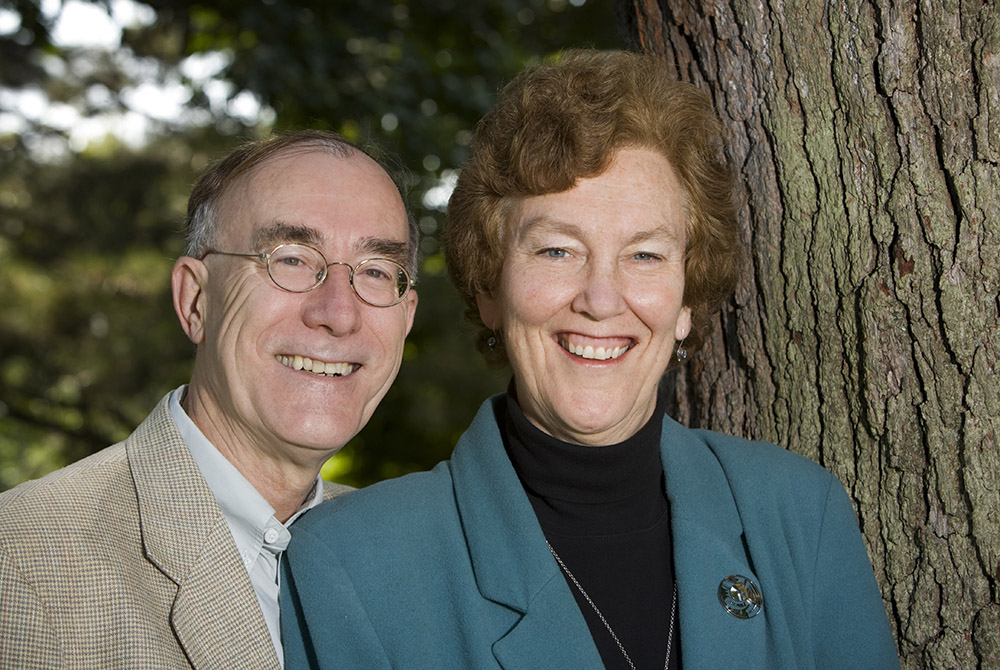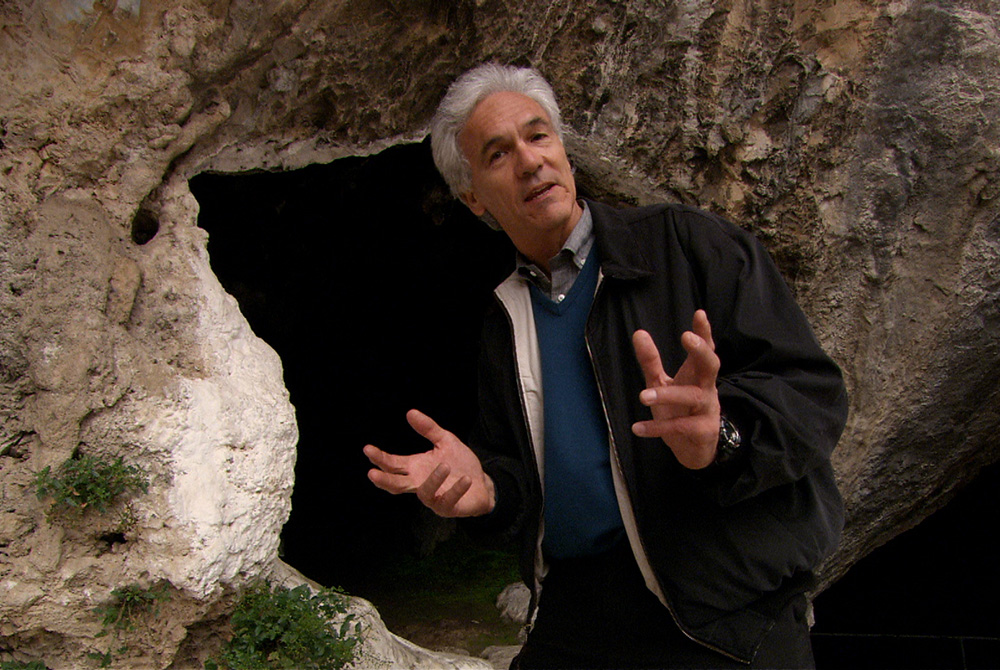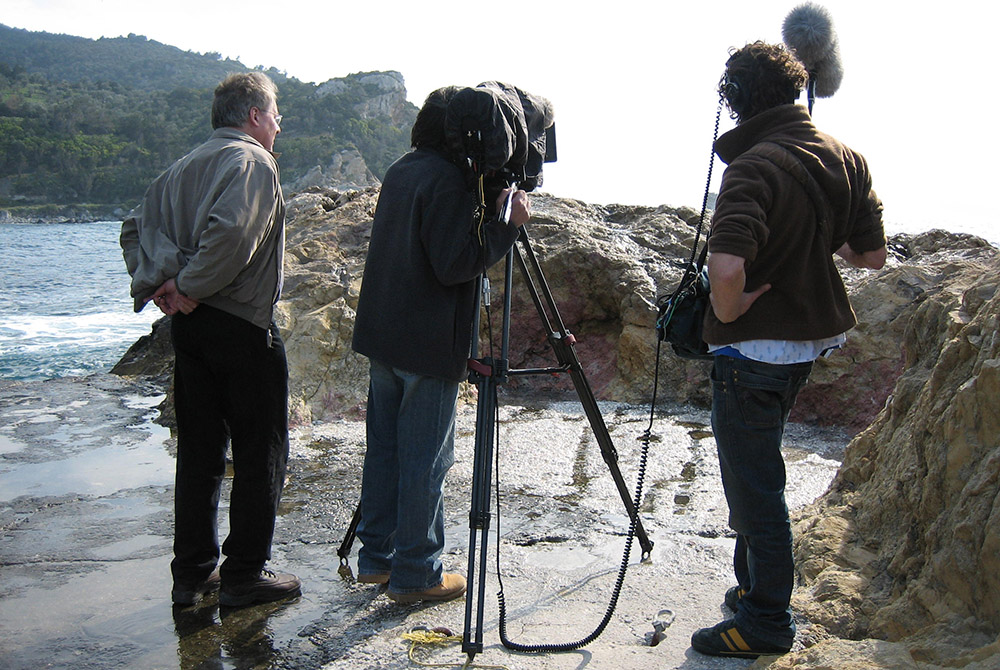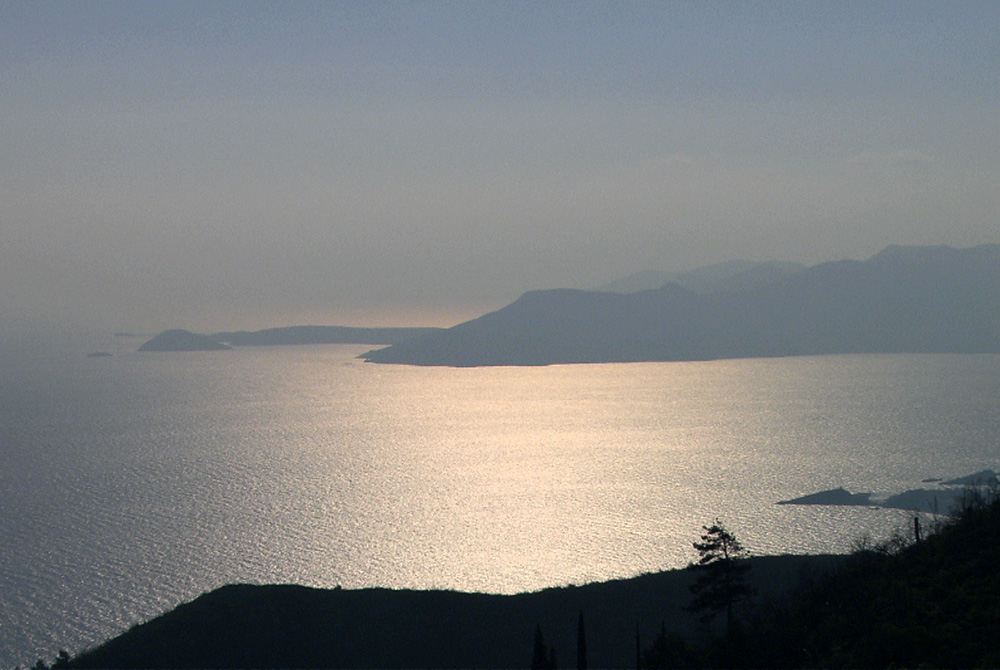Ten years ago, evolutionary cosmologist Brian Swimme took television viewers on a daylong journey to the tiny Greek isle of Samos to tell the nearly 14-billion-year tale of a vast, unfolding universe, from clouds of space dust into the creation of stars, galaxies, planets and ultimately life and human existence on Earth.
"What if the universe itself has its own unique story to tell, one in which we play a profound role?" the host asks in the opening of the film "Journey of the Universe."
Since its debut in June 2011 on PBS station KQED in San Francisco, the hourlong documentary has won an Emmy, been translated into at least four languages and been screened on every continent.
"Journey" draws on teachings of scholars like Jesuit Fr. Pierre Teilhard de Chardin and Passionist Fr. Thomas Berry, the self-described "geologian" who collaborated for years with Swimme and the film's producers — the husband-and-wife team of John Grim and Mary Evelyn Tucker, co-founders of the Yale Forum on Religion and Ecology — in developing a deeper understanding of an ever-expanding universe and humanity's role in the Great Work to address current ecological crises and usher in a more sustainable era.
The film has spawned a book and a series of video conversations, later turned into podcasts, with scientists, Indigenous leaders and teachers. In 2016, Tucker and Grim launched a three-class online program that has enrolled nearly 40,000 people.
On April 10, Swimme, Tucker, Grim and others will reunite online to discuss the 10-year journey to bring the film to life, its reception during the last decade and where it heads next.
EarthBeat spoke with Tucker, who wrote the film script and book with Swimme, and Sam King, a research associate with the Yale Forum who will also talk at the anniversary event, about the film, its impact and its future.
This interview has been edited for length and clarity.

John Grim and Mary Evelyn Tucker, co-founders of the Yale Forum on Religion and Ecology, served as co-executive producers of "Journey of the Universe." (Courtesy of Journey of the Universe)
EarthBeat: When you look back on "Journey of the Universe" what stands out to you still? What has been its impact?
Mary Evelyn Tucker: The fact that it is evergreen has been a great blessing, because many films are made and they have a certain shelf life. But I think the lasting quality — on television, PBS, Netflix, now Amazon Prime — has been quite extraordinary.
There is a need for a story that gives us a sense of the richness of science and evolution, but woven together with meaning and with awe and wonder for the human.
Sam King: I first encountered "Journey" while attending a workshop led by Mary Evelyn and John. I was immediately enthralled, particularly by the ways in which "Journey" creates this guiding narrative to orient our lives in this particular historical moment where we've learned profound scientific insights about our place in an evolving universe, but also benefited from the moral force and spiritual insights of religious traditions around the world. … I'll never forget the ways in which the film lit up the eyes of my students, and elicited a sense of awe and wonder that every teacher wants to cultivate in their students.
Where did the idea for the title come from, and why "journey" as opposed to, maybe, history?
Tucker: History has something of an objective feeling. It's kind of out there: We'll tell the story, you'll know it, we're authorities or something. Journey has this invitational sensibility. We're telling one particular view of it, but it's not the final or definitive view of this massive evolutionary narrative. Journey is evocative, it's invitational, it's participatory.

Brian Swimme stands outside the cave of Pythagoras on the island of Samos during "Journey of the Universe." (Courtesy of Journey of the Universe)
How did you decide on the island of Samos, Greece, as the ideal location for telling this story?
Tucker: Brian [Swimme] loves Pythagoras, because Pythagoras was a scientist but also with this poetic, imaginative sensibility. And Pythagoras was born and lived on Samos. So that was a huge reason.
It was also even more symbolic because it was set on an island in the Mediterranean Sea, amidst Europe and Africa, in between these great continental masses, and on a planet that's in a solar system. So it's kind of concentric circles going out. We orient ourselves on an island that's connected to Earth and cosmos. That was the notion of having the island. And of course, the rich culture [was] a third reason.
Sam, when you show this film to your classes, what's the response from students? Does this story resonate with them?
King: "Journey of the Universe" connects the dots for students who are yearning for a sense of being in the face of all the different influences and challenges that we face in the world today. Students … are clearly yearning to experience a sense of belonging to something larger than themselves.
Seeing themselves as not separate from or an addendum to but part of the unfolding of the universe is a transformative experience for students. … The universe story became the kind of connective tissue that brought together all the subjects that students are learning, which can sometimes feel like separate, disconnected areas of inquiry. In the context of "Journey," they're woven together in this awe-inspiring and incredible uplifting narrative.

Filming of "Journey of the Universe" took place across the island of Samos in Greece and was led by director David Kennard. (Courtesy of Journey of the Universe)
In these 10 years since the film debut, has this story of the universe become more widespread or more relevant?
Tucker: Yes, more relevant than ever. … I think this notion of a living Earth community is growing ever more robust and accessible in a variety of ways, where you have animal cognition, that the animal world is a sentient living world, that trees communicate with their roots and fungi and so on. This is something that Indigenous peoples understood well.
There's a new appreciation for the resonance, interactions and interdependence of Earth systems, and that's a huge part of what we were trying to do with "Journey." Thomas Berry speaks of everything as "a communion of subjects" and has interiority, the world is ensouled. That's what we're trying to evoke here. [Nature is] not dead matter that we can destroy.
Over 10 years, environmental problems have increased, but also the sensibility, of Gaia as the living Earth and unity of life and how precious it is. "Journey" is trying to … invite people into transformative action on behalf of the living Earth community.
What are the implications of these ideas for religious traditions? And what reactions have you heard from religious communities to the film and this story?
Tucker: We wove into the film and the book the sensibilities of the world's religions. [When] Brian gets onto a boat and says, "What if we imagine ourselves as the mind and heart of heaven and Earth?" That's a Confucian idea, and there's interdependence in Buddhism woven throughout. This is in collaboration with, in dialogue with, the world's religions. It doesn't override them.
King: Thomas Berry talked about how religions are entering their cosmological and planetary phases. And so the film is inviting this dialogue about how religions orient themselves to an evolving unfolding universe. Religious traditions are not fixed and ossified entities, but evolving and reinterpreted, reevaluated as culture and society evolves to meet different paradigms and knowledge systems.
[In a recent sermon], I talked about the connection to the universe story as an antidote to the loneliness and human isolation that so many of us have experienced during the pandemic. We feel siloed behind our Zoom screens or as we socially distanced at home. How can we use what, Tu Weiming, the scholar of Confucianism, called … anthropocosmic perspective? Seeing oneself as embedded in Earth and the cosmos, we experience a sense of belonging during a time of isolation.
Advertisement
Besides being a film, "Journey" has been a book, a series of interviews, online course series, the focus of conferences. How is it being shared today?
King: I have developed a secondary school teacher's manual that's available on the "Journey" website to help teachers tell the story of the universe using the 11-part paradigms outlined by "Journey" in a way that internalizes and brings these insights of evolutionary cosmology into one's own experience.
I'm also lucky to be working with a number of educators around the country to build a website that is bringing together resources for educators on telling the story of the universe to adolescents. [Such resources make "Journey"] more accessible for teachers who might be reluctant to teach something that seems outside of their area of expertise. That allows educators to lean into this deep time perspective, that history does not start with the ancient cultures of Mesopotamia, Sumer, Egypt and Greece, nor does it start simply with Earth history 4 billion years ago, but with the universe history and the flaring forth 13.8 billion years ago.
!["The essence of the universe story [is] that stars are our ancestors. Out of them everything comes forth," host Brian Swimme states in the 2011 film "Journey of the Universe," which tells a narrative of the nearly 14-billion-year history of the universe, "The essence of the universe story [is] that stars are our ancestors. Out of them everything comes forth," host Brian Swimme states in the 2011 film "Journey of the Universe," which tells a narrative of the nearly 14-billion-year history of the universe,](/files/JOTU-ST-milky-way-galaxy-astro_bq_m%20c.png)
"The essence of the universe story [is] that stars are our ancestors. Out of them everything comes forth," host Brian Swimme states in the 2011 film "Journey of the Universe," which tells a narrative of the nearly 14-billion-year history of the universe, drawing an evolutionary line from the "great flaring forth" of the Big Bang to human life today. (Courtesy of Journey of the Universe)
Do you see the story that "Journey of the Universe" tells as counter to a previously existing narrative of how we understood the universe or human history?
Tucker: The idea of evolution is relatively new in human consciousness and human understanding. The Darwinian book, On the Origin of Species, is not more than 150 years old. So this idea is still emerging in human consciousness. Galileo and the notion that we're not an earth-centered universe … took a long, long time for people to understand and accept.
In the last 100 years, all the disciplines of science, from astronomy to biology and botany, have contributed to our understanding. That's what's so exciting about this moment — we have knowledge to tell this like a string of pearls from the different emergent processes, from galaxies and stars, to planetary systems, to ecosystems and to the human. We have that from science.
We have not heard from science a desire or ability to tell this with a sense of meaning or purpose. In other words, it's facts not laden with values or meaning. So science has favored the random universe, a purposeless universe. That's something that is not really compatible with how humans live their lives. And yes, religions have their creation stories, [but] haven't really incorporated science until fairly recently. That's why Thomas Berry was calling for a new story.
I feel our society is very much between religious stories that are somewhat circumscribed [and] a scientific understanding of evolution that is also circumscribed. One is saying all the meaning is here in this religion, and the other is saying no meaning. We're going between that, weaving together the richness of science, and the complexity, with a sense of meaning. We talk about awe and wonder and reverence to evoke reverence and care and compassion for both people and planet, along the lines of Laudato Si', that there's a cry of the Earth and cry of the poor, eco-justice.

The Greek isle of Samos served as the setting for filming of the 2011 documentary "Journey of the Universe." (Courtesy of Journey of the Universe)
Thomas Berry spoke of an ecological awakening, and Pope Francis has called for an ecological conversion. Does it feel like we're any closer to that ecological awakening?
King: I think people are realizing that we have to reevaluate how we encounter the more-than-human world around us, both for our own preservation and also to nurture something larger than ourselves. [You see that] within the Catholic tradition from Pope Francis, who has a scientific background himself as a chemist, and that came through very much in Laudato Si', and certainly in many other traditions around the world and many of our Indigenous traditions.
The 2020s are seen as a critical decade for cutting greenhouse gas emissions and lowering global temperatures. What role can this film and this story play, and how it might inform religions about the role they can play during this critical decade?
Tucker: The religions are already moving to this space, and some people within these traditions are inspired as well by Thomas Berry or "Journey of the Universe" perspectives. So I think these are complementary, and in this way the religious language and traditions and scriptures and teachings and rituals need to be brought forward to respond to our planetary crisis. It's a range of crises including climate change and biodiversity loss and pollution and so on.
King: My hope is that "Journey of the Universe" can help to work toward the idea of an ecological civilization through education, law, economics and governance. That "Journey of the Universe" as this guiding story can help us imagine our social, political and economic institutions in a way that leads toward the flourishing of the entire Earth community.
In a more pragmatic sense, in the United States, I hope projects like "Journey" can inspire the political wherewithal to take greenhouse gas emissions seriously, commitments like the Paris climate accord, and [to take seriously] this idea of being a part of a planetary civilization, not simply isolated, competitive nation-states. I think "Journey" helps to elicit that consciousness that we're all-interconnected, we are all part of the same unfolding universe story and that this planet belongs to us all.








